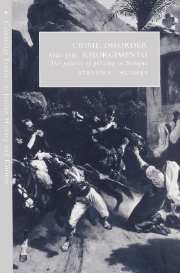Book contents
- Frontmatter
- Contents
- List of illustrations and tables
- Acknowledgments
- List of abbreviations and note on footnotes
- Map 1 Primary political divisions of the Papal States in 1842
- Map 2 Legation of Bologna 1821
- Introduction
- 1 Setting the stage: Bologna, the ancien régime, and Napoleon
- 2 Consalvi's cops
- 3 Functions and failures (1815–1831)
- 4 Public order and the revolution of 1831
- 5 Reform and failure (1832–1847)
- 6 Reform and revolution (1847–1849)
- 7 The search for stability and the turn to Piedmont (1849–1859)
- 8 Epilogue: Risorgimento, freedom, and repression
- 9 Conclusion
- Appendix A Personnel plans of Bologna's Provincial Police, 1816–1863
- Appendix B The pattern of crime in Bologna, 1819–1846
- Index
7 - The search for stability and the turn to Piedmont (1849–1859)
Published online by Cambridge University Press: 06 July 2010
- Frontmatter
- Contents
- List of illustrations and tables
- Acknowledgments
- List of abbreviations and note on footnotes
- Map 1 Primary political divisions of the Papal States in 1842
- Map 2 Legation of Bologna 1821
- Introduction
- 1 Setting the stage: Bologna, the ancien régime, and Napoleon
- 2 Consalvi's cops
- 3 Functions and failures (1815–1831)
- 4 Public order and the revolution of 1831
- 5 Reform and failure (1832–1847)
- 6 Reform and revolution (1847–1849)
- 7 The search for stability and the turn to Piedmont (1849–1859)
- 8 Epilogue: Risorgimento, freedom, and repression
- 9 Conclusion
- Appendix A Personnel plans of Bologna's Provincial Police, 1816–1863
- Appendix B The pattern of crime in Bologna, 1819–1846
- Index
Summary
With the Austrians in the Legations and the French in Rome, the Republic came to an end; but even as the dust of the revolution settled, its aftershocks would continue. Despite the presence of thousands of foreign troops and the imposition of martial law, crime and disorder did not disappear. In the rural areas, brigandage reached new heights, leading to draconian measures by the Austrians and new popular recriminations against the restored papal police for their corruption and inefficiency. Meanwhile, the reactionary Zelanti gained the upper hand in Rome, and Pius IX, disgusted and disappointed by the excesses of the last two years, turned his back on the moderates and the constitution they craved. Within this absolutist framework some administrative and economic progress came to the Papal States during the 1850s: railroads would be planned, banks founded, and gas lighting introduced. But such changes tended to be uneven, underfunded, and dictated from on high, often failing to win the acclamation of elites who felt the fundamental political and social problems of their country – particularly poverty and crime – were still being ignored in Rome.
Combining a lack of personal freedom with a lack of public security, the papal regime offered very little to the moderates, and the death of the constitution forestalled possible amelioration. In that sense, the Legations were worse off than in the days of Gregory XVI, when the editors of the Felsineo could innocently lay forth the best of plans in the assumption that they would eventually come to power.
- Type
- Chapter
- Information
- Crime, Disorder, and the RisorgimentoThe Politics of Policing in Bologna, pp. 203 - 243Publisher: Cambridge University PressPrint publication year: 1994



